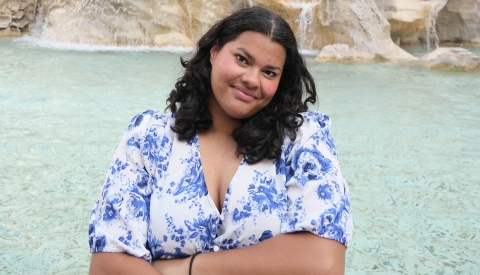

Student and People of the Global Majority (PGM) lead ambassador Solène Gabriel explains what Black History Month means to her.
5 min read
Growing up as a French Mauritian in a predominantly white neighbourhoods, I often felt a profound sense of invisibility.
My heritage - a blend of African, Asian, and European roots - seemed to have no place in the curriculum, in the faces of my classmates, or in the narratives we were taught. The lack of representation wasn’t just about not seeing people who looked like me; it was a deeper issue of erasure, a void where the stories of diverse cultures should have been.
It left me searching for a sense of belonging in a world that didn’t seem to recognise my existence. Black History Month has always been more than a commemoration to me. It is a reclaiming of space, a powerful declaration that Black voices, and by extension, all marginalized voices, matter.
This year’s theme, 'Reclaiming Narratives', underscores the importance of shedding light on the stories that have been silenced or distorted. For me, it’s an opportunity to celebrate the histories of people of African descent and to highlight how African culture has shaped both the world at large and my own identity.
Writers like Chimamanda Ngozi Adichie have had a significant influence on how I view the world
Through Adichie's works, such as We Should All Be Feminists and Half of a Yellow Sun, she has challenged the often simplistic and stereotypical portrayals of Africans in literature.
By reclaiming the narrative, Adichie presents African characters not as mere victims of circumstance but as individuals with agency, ambition, and complexity. Her storytelling fuelled my desire to learn more about African history and culture, motivating me to delve deeper into my own roots.
Historically, Africa’s contributions to global culture and progress have been either downplayed or ignored altogether. Yet, figures like Nelson Mandela, whose relentless fight for justice and equality sparked movements across the world, serve as reminders of the continent's profound impact.
Similarly, Maya Angelou’s work, with its blend of poetry and prose, connected the African American experience to larger themes of resilience, identity, and hope. Though their stories are centred on Black experiences, they transcend racial lines and speak to the universal struggle for dignity and justice.
As a child, this absence of cultural representation in my everyday life was difficult to navigate
It was isolating not to see my heritage reflected in my education or in the stories deemed worthy of being taught. But today, I am witnessing a different reality begin to take shape.
I see people reclaiming their identities, embracing their cultures, and taking pride in their histories. It is a powerful shift - from invisibility to visibility, from silence to voice.
This collective reclaiming of identity fills me with pride and optimism. It gives me hope for the future, where young people won’t have to fight to see themselves represented.
They will grow up with role models and narratives that mirror their own realities, and they will be able to draw strength from those connections. For future generations, there will be a sense of belonging that I longed for as a child.
As a PGM Ambassador, my role is to continue amplifying these voices
I want to ensure that the students from my university and from all backgrounds can see themselves not just as part of the story, but as central to it. Black History Month offers a unique opportunity to honour the rich tapestry of African culture, celebrate its undeniable influence on global history, and acknowledge how it continues to shape identities around the world - including my own.
The journey of reclaiming our narratives is not solely about reflecting on the past; it’s about moving forward with a renewed sense of purpose. It’s about recognising and uplifting the contributions of cultures that have shaped the world in countless ways.
For me, this month is a reminder that my identity - my blend of African, Asian, and European heritage - is something to be proud of. It ties me to a broader, ever-evolving story that I, too, have the power to shape.
Black History Month is not just a moment in time; it’s a movement. It’s a celebration of the past, a validation of the present, and a vision for the future - one in which every story is valued, and every voice is heard.
Every great dream begins with a dreamer.
Always remember, you have within you the strength, the patience, and the passion to reach for the stars to change the world.
Harriet Tubman, American abolitionist and social activist (1822 to 1913)
